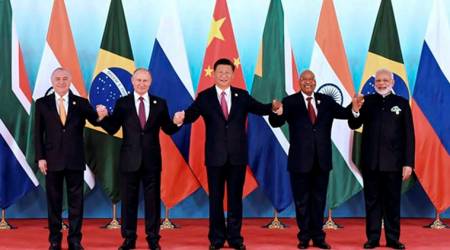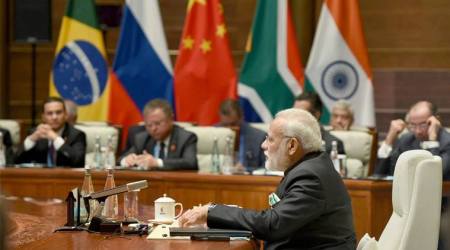 BRICS leaders attend BRICS Business Council and Signing ceremony, at the BRICS Summit in Xiamen. (Source: AP)
BRICS leaders attend BRICS Business Council and Signing ceremony, at the BRICS Summit in Xiamen. (Source: AP)
From Goa to Xiamen, BRICS has evolved its views on major issues — from terrorism to corruption, North Korea to protectionism.
Terrorism
In Goa, while Prime Minister Narendra Modi called Pakistan “the mothership” of terrorism and said “terrorism has become its favourite child”, there was lack of consensus on naming Pakistan-based groups. In Xiamen, India’s diplomats negotiated a strong paragraph that names the groups.
Goa (Word used 24 times): “We strongly condemn the recent several attacks, against some BRICS countries, including that in India. We strongly condemn terrorism in all its forms and manifestations and stressed that there can be no justification whatsoever for any acts of terrorism, whether based upon ideological, religious, political, racial, ethnic or any other reasons. We agreed to strengthen cooperation in combating international terrorism both at the bilateral level and at international fora… We call upon all nations to work together to expedite the adoption of the Comprehensive Convention on International Terrorism (CCIT) in the UN General Assembly without any further delay…”
Xiamen (17 times): “We, in this regard, express concern on the security situation in the region and violence caused by the Taliban, ISIL/DAISH, Al-Qaida and its affiliates including Eastern Turkistan Islamic Movement, Islamic Movement of Uzbekistan, the Haqqani network, Lashkar-e-Taiba, Jaish-e-Mohammad, TTP and Hizb ut-Tahrir. We deplore all terrorist attacks worldwide, including attacks in BRICS countries, and condemn terrorism in all its forms and manifestations wherever committed and by whomsoever and stress that there can be no justification whatsoever for any act of terrorism…We call for expeditious finalization and adoption of the CCIT by UN General Assembly.”
Nuclear Suppliers Group
In both declarations, BRICS underlines the “importance of predictability in accessing technology and finance for expansion of civil nuclear energy capacity” — the same argument given by India in its quest to become a member of the NSG. While China has been blocking consensus at the NSG, it has been playing along with India’s reasoning since Goa. However, during discussions in November and June, it blocked India’s application and insisted on “criteria-based approach”. In Xiamen, Indian officials said they have got China and other countries to sign on a more elaborate paragraph, citing the urgency of climate change.
Goa: “We recognise that nuclear energy will play a significant role for some of the BRICS countries in meeting their 2015 Paris Climate Change Agreement commitments and for reducing global greenhouse gas emissions in the long term. In this regard, we underline the importance of predictability in accessing technology and finance for expansion of civil nuclear energy capacity which would contribute to the sustainable development of BRICS countries.”
Xiamen: “We recognize that sustainable development, energy access, and energy security are critical to the shared prosperity and future of the planet… We will work to foster open, flexible and transparent markets for energy commodities and technologies. We will work together to promote most effective use of fossil fuels and wider use of gas, hydro and nuclear power, which will contribute to the transformation toward a low emissions economy, better energy access, and sustainable development. In this regard, we underline the importance of predictability in accessing technology and finance for expansion of civil nuclear energy capacity which would contribute to sustainable development in BRICS countries…”
North Korea, nuclear test
With China eager to play the role of a leader in the region in particular and the world at large, Indian sources said, a rift has been growing between China and North Korea.
Goa: No mention of North Korea.
Xiamen: “We strongly deplore the nuclear test conducted by the DPRK. We express deep concern over the ongoing tension and prolonged nuclear issue on the Korean Peninsula, and emphasize that it should only be settled through peaceful means and direct dialogue of all the parties concerned.”
Protectionism
Another offshoot of China’s aspirations to play a more proactive role on the global stage. The statement included a sentence about “firm opposition to protectionism” in light of the Trump administration’s moves.
Goa: “We reiterate our support for the multilateral trading system and the centrality of the WTO as the cornerstone of a rule based, open, transparent, non-discriminatory and inclusive multilateral trading system with development at the core of its agenda. We note the increasing number of bilateral, regional, and plurilateral trade agreements, and reiterate that these should be complementary to the multilateral trading system…”
Xiamen: “We emphasize the importance of an open and inclusive world economy enabling all countries and peoples to share in the benefits of globalization… We will continue to firmly oppose protectionism. We recommit to our existing pledge for both standstill and rollback of protectionist measures and we call upon other countries to join us in that…”
Corruption
Cracking down on black money — a project often stressed by PM Modi — gets a more expansive mention.
Goa: “We support the strengthening of international cooperation against corruption, including through the BRICS Anti-Corruption Working Group, as well as on matters related to asset recovery and persons sought for corruption. We acknowledge that corruption including illicit money and financial flows, and ill-gotten wealth stashed in foreign jurisdictions is a global challenge which may impact negatively on economic growth and sustainable development. We will strive to coordinate our approach in this regard…”
Xiamen: “… We reaffirm our commitment to intensify dialogue and experience sharing and support compiling a compendium on fighting corruption in BRICS countries. We further acknowledge that illegal flow of the proceeds of corruption impairs economic development and financial stability, and support enhanced cooperation in asset recovery. We support the strengthening of international cooperation against corruption, including through the BRICS Anti-Corruption Working Group, as well as on matters related to asset recovery and persons sought for corruption. We acknowledge that corruption including illicit money and financial flows, and ill-gotten wealth stashed in foreign jurisdictions is a global challenge which may impact negatively on economic growth and sustainable development. We will strive to coordinate our approach in this regard…”
One Belt One Road
No mention in either statement.

